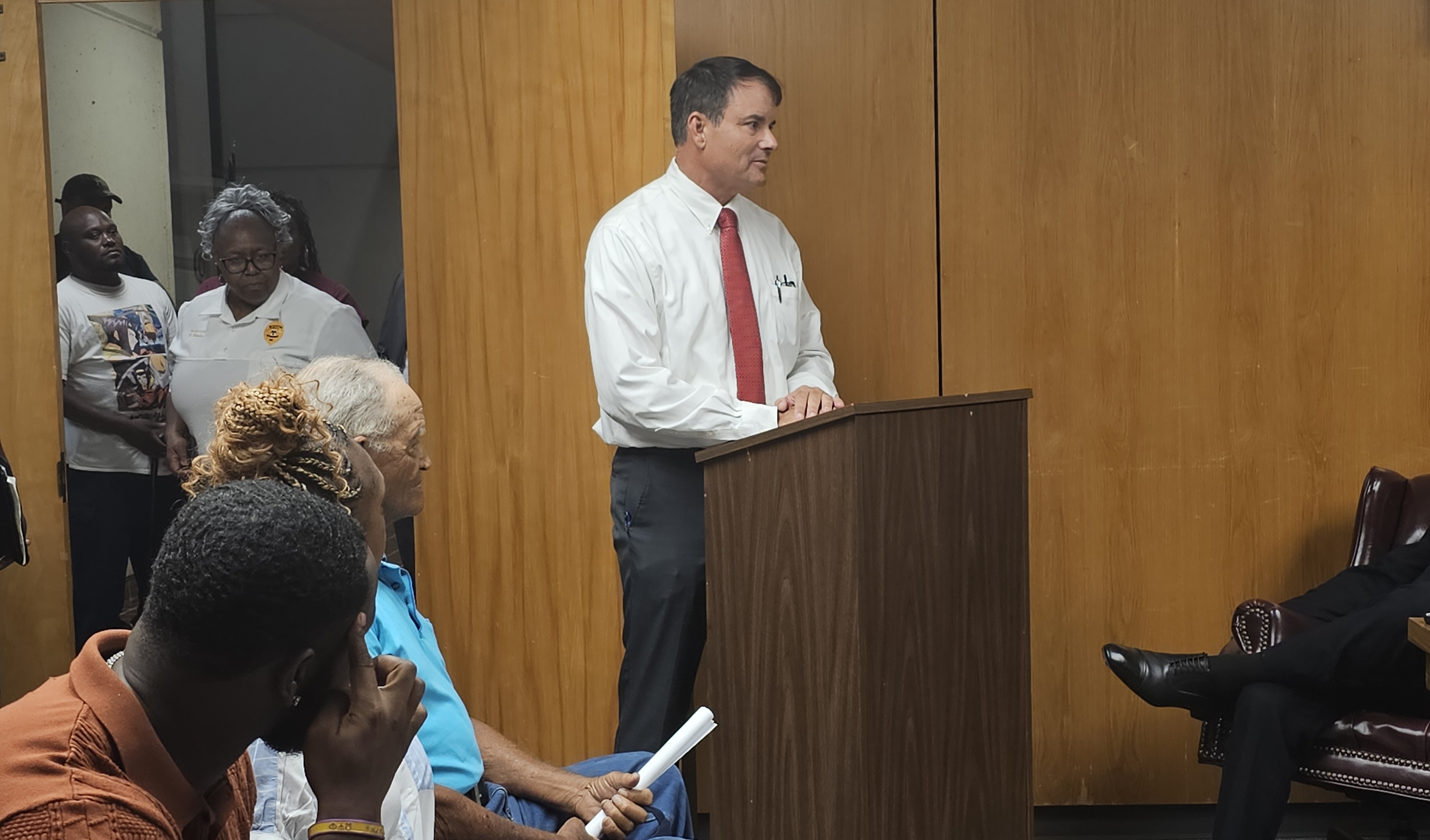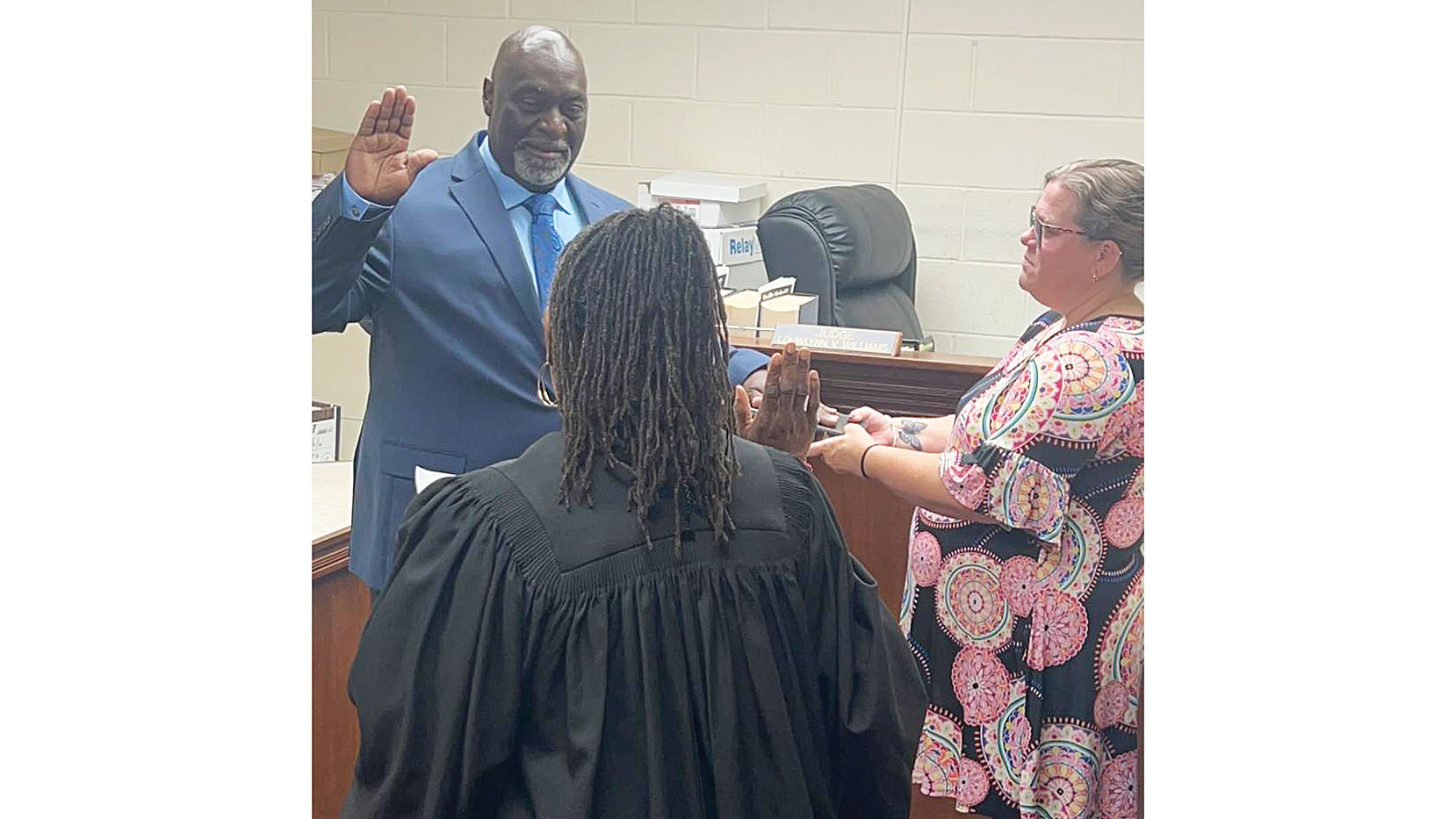The future of conservation
Published 8:00 am Saturday, August 24, 2024

- Former "Alligator Man," Ricky Flynt signs a hat for Southwest Mississippi NDA Chapter President Bruce Gray Thursday night. (Hunter Cloud | The Daily Leader)
BROOKHAVEN — In front of an audience of 220 people, Mississippi Outdoor Stewardship Trust Fund Executive Director Ricky Flynt took center stage to speak about the future of conservation. Flynt was a guest speaker for the 2024 Southwest Mississippi National Deer Association gun blast Thursday night.
Some Mississippians know him simply as the “Alligator Man,” as he led the Mississippi Department of Wildlife, Fisheries and Parks Alligator Program for 20 years. His career with the MDWFP began in 1993 at Mahannah Wildlife Management Area near Vicksburg.
Coincidentally, he went to Mississippi State with one of the local NDA banquet committee members. Adjusting the microphone, Flynt explained to the crowd he wanted to share more about the Mississippi Outdoor Stewardship Trust Fund.
“Everyone here will have some interest in what it can bring to you and to Mississippi,” Flynt said. “I appreciate what this organization (NDA) is about. IF we can always keep the resource first and foremost we will come out better. The outdoor stewardship trust fund was approved by the legislature after a number of attempts to get it passed. The legislature has funded our program for three years now.”
A fund for everyone
Mississippi’s legislature appropriated $10 million to the Mississippi Outdoor Stewardship Trust Fund in 2022 for the first year of funding. Flynt said in 2023 $15 million was appropriated to the Stewardship Trust Fund.
Of the $10 million appropriated in 2022, $9.74 million funded projects with $31.4 million in matching funds. In 2023, $14.4 million funded projects were matched with an additional $29.8 million in funding.
The fund’s goal is to be a source of funding for managing and improving resources, conservation, water and soil conservation, protecting wildlife, habitats, cultural sites and historic resources. It also helps connect Mississippians to the outdoors and supports economic development.
A slide flashed across the screen to show how evenly distributed project awards have been across the state. Some of those projects went to nearby Percy Quin State Park and Camp Kamassa.
Mississippi’s third application period is open right now. Flynt explained to the crowd they take the projects, score them and rank based on scores and available funds.
“Outdoor Stewardship Trust Fund is for everyone. You don’t have to be a hunter to benefit,” Flynt said.”There are still a lot of communities who have a need for funding. We hope the legislature will continue to fund us to meet that need. It is nice to be here. I know where I was before. I was contributing to a lot of things. Now I can paint a wider swath for outdoor conservation.”
Future of hunting
Flynt shifted his attention to another facet of conservation, the tradition of hunting. He asked the crowd how secure they were about the tradition of hunting. Two pictures flashed onto the screen, one was the American Bison, the other a mound of bison skulls.
Greed, he said, pure greed led to the almost extinction of the American Bison. A native species which once lived in the prairies of Mississippi
“We don’t want to repeat history. We have learned we made mistakes with natural resources,” Flynt said. “Thankfully, during the turn of the 19th to 20th centuries we had a few people who saw the need for wildlife conservation. Theodore Roosevelt. We have a lot of things to thank him for. He saved our wild places and passed regulations to protect natural resources. Aldo Leopold was considered the father of conservation.”
Bison were not the only wildlife species over harvested by market hunters. Flynt pointed to white-tailed deer. He said in the 1900s just 215,000 deer were in the United States. Mississippi has a population around 1.5 million deer now. Current deer herd estimates are 32 million.
Flynt told the crowd the conservation success of deer did not come easy. Neither was the recovery of the wood duck. Any hunter who has hunted near a creek or bayou can recall the whistling of wood ducks at first and last light.
Wood ducks were nearly extinct but survived thanks to a moratorium on wood duck harvest until 1940. North America now has a wood duck population with over 3,000,000 breeding pairs.
Wild Turkeys are another conservation success and one Flynt worked hands on with in college. It took a lot of work over decades for turkey numbers to recover to an estimated total of 6.7 million turkeys nationwide across subspecies.
Flynt naturally mentioned the American Alligator which had a tremendous recovery. In 1967, the Endangered Species Act protected alligators. By 1970, Louisiana developed a way to raise gators in farms taking pressure off of wild alligator populations for their hide.
Today there are 2 million Alligators in Louisiana alone. Mississippians are able to hunt alligators in a draw hunt season which starts next week.
“Data is key. Sometimes it seems bothersome but it is very important,” Flynt said. “Hunters carry the weight of conservation more than anyone else. Your efforts and going out is as important as the license you buy. Wildlife agencies are funded by license sales. They otherwise could not provide the resources you experience. The resource should always be the priority, we can not become complacent.”
Flynt challenged the young people in the room to speak to the older generation of hunters about how things used to be in Mississippi. Deer used to be so rare it was big news to find a deer track. He challenged the crowd to take people hunting.
“If you will, make a promise this hunting season to take at least one kid hunting with you. One that has never been hunting before. Show the full experience,” Flynt said. “Sit on the ground near a creek where they can see the morning wake up. When they hear the distant gunshot it will get them excited. That is the important part. I want to see us getting back to that more. Find an adult too. Remember, someone introduced you to hunting.”
Hot issues
Flynt turned his attention to hot issues in conservation. He shared thoughts on some issues which are not new to readers who read about his public comments at the March MDWFP Commission meeting.
Degradation of hunting efforts was the first issue he pointed out. In nearly 30 years of working with MDWFP, Flynt told the crowd he ran into several people whose only purpose to be in the outdoors was to kill something at whatever means possible.
“That hurts our tradition. They hurt hunting in Mississippi and nationwide,” Flynt said.
He brought up the topic of supplemental feeding. Mississippi State University conducted an aerial survey of supplemental feeders this past year and found it is widespread in Mississippi.
“Now it is becoming serious for wildlife diseases. The placement of feed is creating a problem,” Flynt said. “There is a drive thru hunting experience now. When I was young, I longed for the opportunity to hunt. It was all about the night before, the drive in to camp, the walk to the stand, getting back up with everyone for lunch. Now I’m seeing this drive-thru mentality. We have a segment that is driven by peer pressure and driven by the need to be successful.”
He reminded the crowd to be vigilant and to try and enjoy hunting for the experience and process. His attention next went to Chronic Wasting Disease.
As of Aug. 23, 2024, Mississippi has found 318 deer positive for Chronic Wasting Disease since first detection in Feb. 2018. One of those deer tested positive in Claiborne County and is the closest positive to Lincoln County.
Flynt told the crowd CWD is here and it is not new. Some areas the disease prevalence is high such as north Mississippi along the Tennessee border. Shutting down deer hunting is the last thing MDWFP wants to do.
“You need to trust MDWFP,” Flynt said. “They understand if we lose deer or hunting it is just the tip of the iceberg. Listen when they give you suggestions, when they ask you for data. There is a reason,” Flynt said. “It is not to shut down deer hunting. We must have more CWD sampling to understand it more. As much as we know about CWD there is a tremendous amount we don’t know. We learn more and more every year. Because of that you will see agencies take a conservative approach. Understand that a little bit. We have a hunting tradition that is in danger. I see a storm brewing.”





